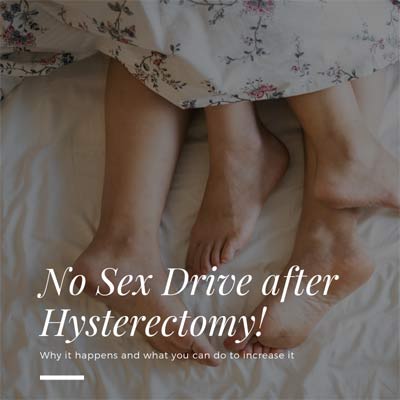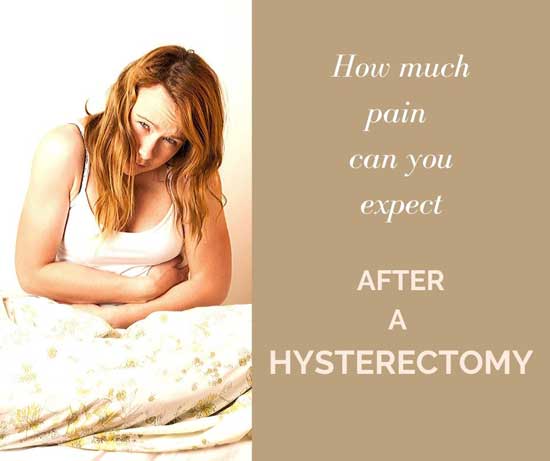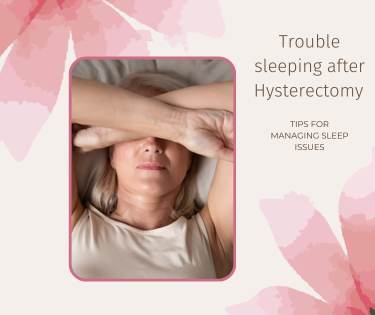Hysterectomy for Endometriosis – Get All The Facts Before You Decide
This blog is reader-supported. When you buy through a link on our site, we earn a commission at no extra cost to you. Read more
A lot of women assume that having a hysterectomy for endometriosis will automatically put an end to the misery of their painful symptoms. If you have endometriosis that is causing a lot of pain and distress, you surely may like to know if a hysterectomy could be the solution.
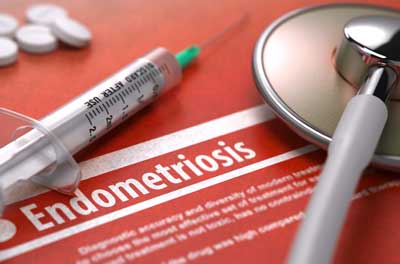
Unfortunately, in reality, it does not always work out this way. In this article, we would like to help you understand more about the pros and cons of a hysterectomy for endometriosis. As well as what you have to consider before you go ahead with a hysterectomy surgery to treat endometriosis.
When to Have a Hysterectomy for Endometriosis
Hysterectomy surgery is often the last resort if non-surgical treatments fail to reduce pain and manage symptoms, especially for younger women. This has a lot to do with the fact that they remove the womb, and the chance of becoming pregnant is, therefore, gone. Removing the ovaries also makes it more likely that you will go into early menopause, which can be another issue for younger women to cope with.
Hysterectomy may be recommended as a way to try to cure endometriosis, but it is totally up to you to decide whether you will go through with it. Even if you have been advised by your doctor that a partial or total hysterectomy is your best option for treating endometriosis, it is still worth getting a second opinion.
Before making a decision, you can gather information about the alternative treatments that are available. For instance, you can read personal experiences from women who have had a hysterectomy for endometriosis.
Alternative treatment for endometriosis
There is no cure for endometriosis, and the focus is always on managing symptoms and improving quality of life. That brings us to the question: what is the best treatment for endometriosis?
Some women are able to reduce pain and manage symptoms through non-surgical treatments and do not need to go down the hysterectomy road.
Endometriosis treatment options
Endometriosis pain management
Some of the treatment options to alleviate pain before you start thinking about having a hysterectomy for endometriosis include paracetamol and Non-Steroidal Anti Inflammatory Drugs (NSAIDs) such as ibuprofen or naproxen or a combination of both medications.
They usually prescribe these drugs for menstrual cramps and pelvic pain. But they can also help women to be more comfortable during endometriosis flare-up attacks. Then again, they will not do anything to stop endometriosis from progressing further, and symptoms can continue to worsen.

Drug-induced menopause for endometriosis treatment:
Hormone treatment is another option and involves suppressing cyclical fluctuations of estrogen by stopping ovulation. They do this to slow down the growth of endometrial tissue, which is often increased by estrogen.
They can do this with the combined oral contraceptive pill (which contains estrogen and progestogen), progestogens, and Gonadotropin-Releasing Hormone (GnRH) analogs, which effectively induce menopause that lasts as long as a woman uses them.
The drug Lupron is a Gonadotropin-Releasing Hormone agonist that helps to relieve pain and to reduce endometriosis lesions. For some women, Lupron may help to lessen their symptoms. Then again, this medication may have considerable risks and adverse side effects. It generally is only used for 6 months which means that over time, the symptoms can return.
Osteoporosis is one of the risks women face with this treatment, as well as a range of menopausal side effects associated with low levels of estrogen.
Endometriosis surgery
They can treat endometriosis by surgically removing the lesions. Laparoscopic surgery is one of the surgical treatment options for endometriosis. With this surgery, they will make several small incisions in your abdomen. One incision they use to insert a laparoscope so the surgeon can examine your pelvic organs. The doctor inserts a video camera and other surgical instruments through the other incisions.
During this surgery, doctors will try to remove all the endometrial growths and scar tissue or destroy them with laser or intense heat. This is a complicated and challenging surgery to perform, and you can never be sure that it will completely destroy all of the endometriosis.
How to find the best endometriosis specialist? This article lists 10 valuable tips to help you find a qualified doctor who is able to do a complicated surgery like the excision of endometriosis.
In brief, the positives and negatives of not having a hysterectomy for endometriosis
Positives
- You will still be able to conceive.
- Pain medication, hormonal therapy, or excision surgery may improve your symptoms.
- You are not subject to the risks associated with a major surgery.
- That you won’t have to deal with bothersome symptoms such as hot flashes, depression, or vaginal dryness.
Negatives
- Pain medication does not provide relief, or they have adverse side effects.
- The hormone therapy may have side effects common to menopause symptoms.
- You may suffer years and years of repeated surgeries because the pain keeps coming back.
Hysterectomy to Remove Endometriosis
If none of these treatments help, a hysterectomy for endometriosis may be considered. But unfortunately, a hysterectomy is not a guaranteed cure for endometriosis, and sometimes painful symptoms may persist.
It is possible for your surgeon to remove endometrial tissue as part of your hysterectomy rather than as a separate procedure. This can take longer to perform, but it generally shortens your recovery time, too, so you can go home sooner.
Whatever type of hysterectomy you have, it is likely that you can go home after a few days. If you have severe endometriosis, you may have to stay in the hospital for a bit longer as part of your recovery.
Post Hysterectomy Endometriosis
What causes endometriosis after hysterectomy? Having a hysterectomy can potentially mean that endometriosis symptoms disappear, but this is unfortunately not the case for everyone. A lot of doctors will do a hysterectomy for endometriosis, and occasionally, this will relieve the pain.
However, if the endometriosis is not just on the uterus or the ovaries, and some of the implants remain, there may be a recurrence of endometriosis symptoms. In other words, it depends on how meticulously the surgeon removes the endometriosis for this surgery to be successful.
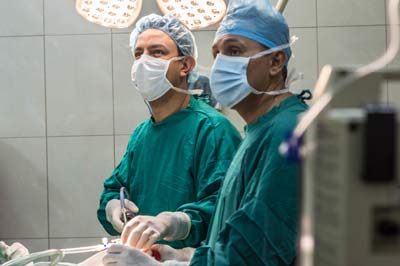
Endometriosis after a partial hysterectomy.
If you have a partial hysterectomy, they leave the cervix. If there was endometrial tissue present on your cervix, it is possible that endometriosis symptoms will not go away after surgery, even if you have had your other pelvic organs removed. You could even have monthly spotting from the retained endometrial lining.
Endometriosis after hysterectomy leaving the ovaries.
The chance of endometriosis recurrence after hysterectomy without removing the ovaries may be as high as 62% in cases of severe endometriosis. Leaving the ovaries puts you at a 6-fold risk of returning pain and an 8-fold risk of a second surgery.
This shows that the ovaries play an important part in whether having a hysterectomy for endometriosis will solve your problem. The ovaries produce estrogen, which is the culprit for triggering endometriosis and will keep the symptoms going.
Important things to take into consideration before removing the ovaries are a woman’s age and the effects early menopause may have.
Hormone therapy may reactivate endometriosis after hysterectomy
After a total hysterectomy, many women get Hormone Replacement Therapy (HRT), which may complicate things. Because the endometrial tissue is responsive to estrogen there is a risk it will promote the recurrence of endometriosis. On the other hand, which type of HRT exactly affects endometriosis remains unclear and needs further research so women can receive the appropriate menopausal treatment.
In brief, the pros and cons of having a hysterectomy for endometriosis
The pros
- You will have no more periods, which is great for women who suffer from heavy bleeding.
- You may have less pain, or you may become pain-free.
- Your quality of life improves considerably.
- It may solve your bladder or bowel issues.
The cons
- A hysterectomy carries risks of complications.
- After a total hysterectomy, you will have to cope with the symptoms of surgical menopause.
- You are at a greater risk of developing osteoporosis.
- The hysterectomy for endometriosis may not have the desired result, and pain may occur again.
What are the symptoms of endometriosis after a hysterectomy?
As mentioned before, when not all the endometriosis is removed during the hysterectomy, painful symptoms may come back. Pelvic pain and painful sex may be some warning signs of endometriosis after a hysterectomy. Other signs are lower back pain and painful defecation.
In rare cases, there may be endometrial lesions left on the vaginal cuff. These lesions can cause vaginal bleeding months or even years after the operation.
In conclusion
Deciding whether to have a hysterectomy to treat endometriosis symptoms can be a very personal decision that depends on the severity of your symptoms and if you still want to have children. You could gain more quality of life from having the surgery than not. Ultimately, there are no guarantees that having a hysterectomy cures endometriosis, so you need to weigh up the pros and cons and try all of your alternative options first.
Reviewed by: Kimberly Langdon M.D. (OB/GYN)
Date reviewed: 18/3/2019
Sources:
- Hysterectomy for endometriosis: Should I Have a Hysterectomy and Oophorectomy?
- Recurrence of endometriosis after hysterectomy
- The management of menopause in women with a history of endometriosis: a systematic review
You may also like
- How to prevent a vaginal cuff tear after hysterectomy
- Tips to Prevent Blood Clots after Hysterectomy That Can Save your Life
- Stressed About Hysterectomy Risks? What Every Woman Must Know
- Pain After Hysterectomy- Tips To Identify Its Source
- 5 Main causes of bowel problems after hysterectomy


